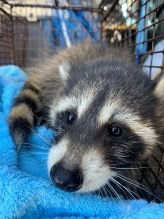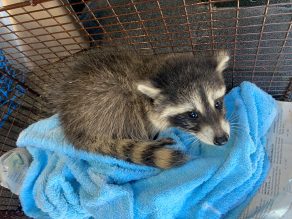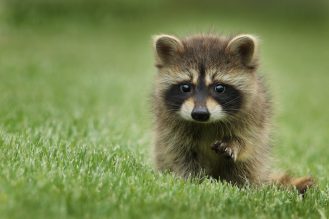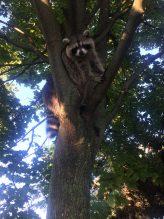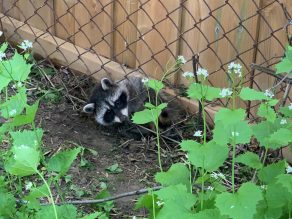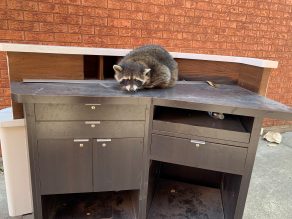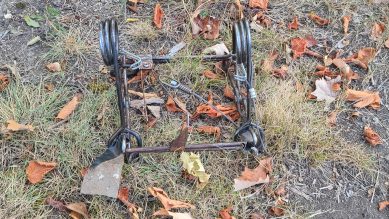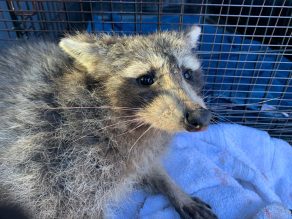Masked Bandit Being a Nuisance in your Neighbourhood? Learn How to Safely Manage Raccoons on Your Property
City services | February 21, 2023
Raccoons are found everywhere in Mississauga and have adapted to urban living. They are intelligent, curious and clever animals who play an important role in our ecosystem. They help with the population control of insects and other small rodents, disperse seeds for plants and they are nature’s clean-up crew – eating remains of dead animals.
These nocturnal, fuzzy animals sport a black mask that covers their eyes, grey-brown fur, a pointed snout with a black nose and a ringed bushy tail. They can weigh between 14 to 23 lbs. While most animals use sight, sound or smell to look for food, raccoons rely primarily on touching. Raccoons are very good with their paws, which contain sensitive sensory receptors. They can differentiate between objects by touching things without seeing them at night.
In the winter, raccoons don’t hibernate. They mostly sleep in their den, waking up to rummage for food. If you see a raccoon in your yard during the day, it’s normal. Raccoons can be active throughout the day, especially during certain times of the year.
Raccoon mating season generally falls between January and June. Females have a 65-day gestation period and usually give birth in the spring to around five kits. The kits stay in the den until they are eight to 10 weeks old, and will stay by their mother’s side for more than a year. Mother raccoons are the only caregiver for the kits, raising them alone.
Often, mother raccoons venture out of the dens to scavenge for food for themselves. It is not unusual for babies to be left unsupervised and alone. Mississauga Animal Services recommends leaving baby wildlife alone. If after 24-hours the mother does not return, Mississauga Animal Services can be contacted.
Raccoons are omnivores. They will eat just about anything, including insects, rodents, amphibians and dead animals. They are also known for sifting through garbage bins and looking for tasty treats. Ensuring proper garbage disposal, rinsing recycling and securing bins can prevent them from sifting through the garbage.
They are usually found in forested areas but make homes in neighbourhoods, on properties that have sheds and under decks. It is not unusual to see a raccoon during the day, to see them scavenging in neighbourhoods or at night when there is very little human activity.
Raccoons do have known predators like owls, hawks, foxes and coyotes. However, most of the time, it is a disease, infection or getting hit by a vehicle that put them at risk of getting hurt, injured or dying.
Annually, Mississauga Animal Services receives hundreds of calls about raccoons on private and public property. Last year, more than 644 inquiries were received about raccoons. Animal Services can respond to and investigate any inquiries involving sick, injured, distressed or deceased animals. They can’t help if an animal has decided to call your property home or if they are being a nuisance on your property. It is recommended to contact a licensed and reputable wildlife removal company if you have concerns about nuisance wild animals.
Signs that a raccoon is possibly sick are lethargic behaviour, discharge in the eyes and them moving slowly, stumbling or wandering aimlessly. Signs that a raccoon is injured include blood, exposure of bone, limping or lethargic behaviour.
Raccoons are always looking for food, shelter and water. They can be hard to get rid of, especially if they find a comfortable, warm and inviting place to build a den.
Raccoons aren’t the best roommates. They can cause a lot of damage and frustration to homeowners – often getting into garbage bins and leaving behind a big mess, destroying vegetable and herb gardens, digging up lawns in search of grubs, and in some cases, ripping up property to find shelter (e.g. roof and exhaust vents, plumbing, eaves troughs, soffits, chimneys, siding, sheds, porches and decks).
If you see a raccoon on your property or find one lurking around your home:
- Avoid physical contact
- Don’t approach, disturb, scare or threaten a raccoon
- Avoid feeding or petting
- Don’t intentionally try to hurt it
- Call a licenced and reputable wildlife removal company that can safely capture it and relocate it within one kilometre
- Keep pets indoors
- If the raccoon looks sick, distressed or injured – call Mississauga Animal Services at 905-896-5858 immediately
- Ensure you vaccinate your pets against rabies and distemper
- If you are bitten or scratched:
- Wash the wound immediately with soap and water and apply antiseptic
- Seek medical attention from a healthcare provider or local hospital as a rabies vaccine may need to be administered
- Call the Region of Peel (Peel Public Health) to report the incident
Make your property inhospitable for raccoons
Lighting and sounds
The first step is learning where the raccoon spends most of its time. Raccoons are nocturnal, so they prefer dark and quiet places. If a raccoon spends a lot of time in your yard, add bright lighting (e.g. floodlights or motion-activated lights) and sounds like a talk radio on an outdoor speaker.
Check your garbage
Put out green bins, recycling and garbage bins or bags on the morning they are picked up. This will help ensure that raccoons can’t get into them or won’t try to tip them over. Raccoons are very savvy creatures and have learned over time how to open up garbage and green bins to access food scrapes. It’s best to avoid putting them out the night before. Ensure garbage bins are fitted with tight and secure lids. Where possible, store garbage and waste bins in an enclosed space like your garage or shed.
Secure the point of entry
In some cases, if a raccoon has moved into your home or is living on your property, it is important to ensure they can’t return to their den once they have been removed.
For many raccoons, building a den is an investment – a lot of time and effort is spent choosing a location safe from predators and close to food and water. They also have food stored in their dens – so keeping them out is crucial. Hiring a wildlife control company can be helpful as they can secure entry points to prevent wildlife from accessing your home.
Remove food sources
Remove any food sources that make an easy meal like pet food or bird feeders. This way, raccoons won’t have a consistent food source to rely on. Constant feeding, even if done unintentionally, can change their normal behaviours. While raccoons aren’t usually a threat to people, they can become a nuisance or act boldly when people interfere by feeding them.
The City asks all residents not to feed wildlife, especially raccoons. This creates a long-term problem for both the wildlife and Mississauga neighbourhoods. If a resident is caught feeding wildlife or intentionally leaving out food for animals, they could face fines from $300 to $100,000.
Trapping raccoons
In Ontario, it is also illegal to trap and relocate an animal more than one kilometre from where it was captured. In addition, trapping wildlife can leave young raccoons orphaned, injured or spread diseases such as rabies.
Using body-gripping traps is illegal and poses a significant risk to public safety. Implementing traps in any urban environment will pose a more significant danger to the public than the raccoons themselves.
Rabies and other illnesses
While raccoons look cute, they can get aggressive and carry a variety of diseases like rabies and distemper. Raccoons, bats, foxes, coyotes and skunks are rabies vectors and can contract the disease.
If you see a raccoon that looks sick, disoriented or aggressive, it could be infected with canine distemper, raccoon roundworm, trichinosis, feline parvovirus or rabies.
While the risk of humans and pets contracting rabies is low, the disease can be fatal if left untreated. Residents are reminded to protect themselves and their pets from exposure and contact with all wild animals, including raccoons.
Rabies treatment is most effective when exposure first happens. The rabies vaccine must be administered before any symptoms appear.
If you see a raccoon that is sick, injured or in distress, contact Mississauga Animal Services at 905-896-5858.
Tags
Media contact
City of Mississauga Media Relations
media@mississauga.ca
905-615-3200, ext. 5232
TTY: 905-896-5151
